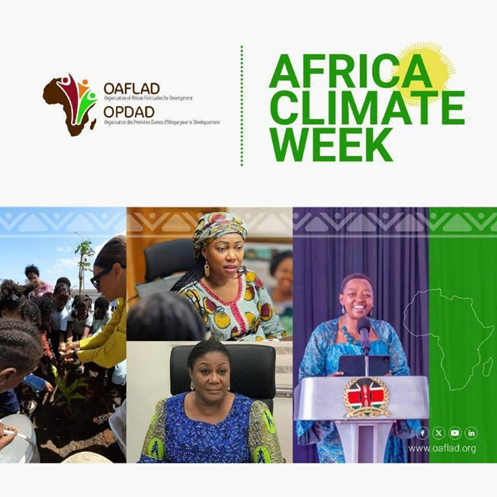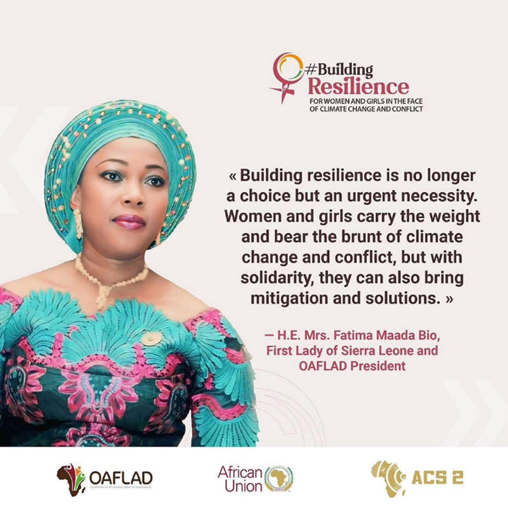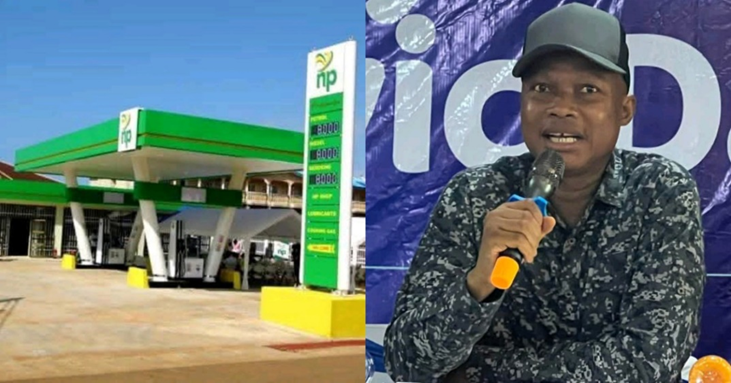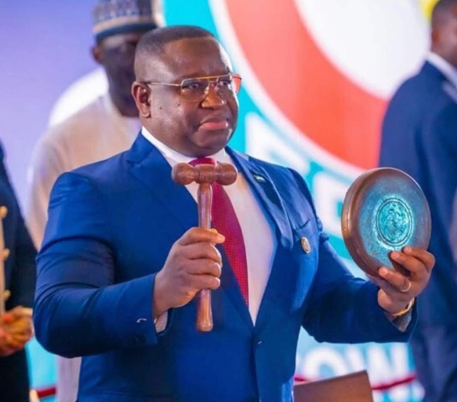By Mackie M. Jalloh
When we speak of resilience in the 21st century, we cannot ignore the twin crises reshaping our societies: climate change and conflict. Both strike at the core of human survival, disrupting livelihoods, destroying communities, and threatening future generations. Yet, as H.E. Mrs. Fatima Maada Bio, First Lady of Sierra Leone and President of the Organization of African First Ladies for Development (OAFLAD), rightly notes, women and girls carry the heaviest burden. They are on the frontlines of these crises, often bearing disproportionate impacts while simultaneously holding the power to drive change and craft solutions.
“Building resilience is no longer a choice but an urgent necessity,” she emphasizes. This statement rings true across Africa and beyond, where the intersection of climate shocks and conflict is already reshaping lives.
Climate change is not gender-neutral. Droughts, floods, and unpredictable weather patterns threaten agriculture—the backbone of most African economies—where women make up the majority of smallholder farmers. In Sierra Leone, for instance, women form nearly 70% of the agricultural workforce, yet they often lack access to land ownership, financing, and technology. When floods wash away crops or droughts destroy yields, it is women who struggle to find food for their families, walking longer distances to fetch water or firewood in degraded environments.
In addition, climate-related disasters increase the risk of health problems, malnutrition, and gender-based violence. Girls are often the first to be pulled from school when families face resource shortages, perpetuating cycles of poverty and limiting their future opportunities. These cascading effects show why building resilience is urgent—not only for survival today but for protecting the rights and futures of women and girls tomorrow.
Conflict adds another layer of vulnerability. Across Africa, from the Sahel to the Great Lakes region, violent clashes, terrorism, and political instability disproportionately affect women. They are more likely to be displaced, experience sexual violence, or shoulder the responsibility of caring for families in the absence of men who may be lost to war or forced migration.
In Sierra Leone’s own history of civil war, women were both victims and peacebuilders. The lessons from that painful chapter remain clear: women are not passive bystanders. They are agents of peace, reconciliation, and recovery. Yet, decades later, conflicts fueled by climate change—competition over water, land, and resources—continue to place women at the center of crises.
Despite these challenges, women and girls are not merely victims—they are also powerful leaders of resilience. In rural communities, women are spearheading sustainable farming practices, using indigenous knowledge to protect biodiversity, conserve water, and adapt to changing climates. In conflict zones, women-led organizations provide humanitarian relief, advocate for peace, and rebuild trust among divided communities.

International recognition of this role is growing. Global frameworks such as the Paris Agreement and the United Nations Security Council’s Resolution 1325 on Women, Peace, and Security highlight the need to integrate women’s voices in climate action and peacebuilding. But recognition is not enough. Real empowerment demands resources, education, and political will.
Mrs. Fatima Bio’s call for solidarity reflects this broader truth: resilience cannot be built in isolation. Women and girls need allies—governments, civil society, international partners, and men who understand that gender equality strengthens entire nations. Solidarity means providing women with access to land, credit, and technology. It means investing in girls’ education so they can become the scientists, negotiators, and policymakers of tomorrow. It means creating safe spaces for women in conflict-affected communities to lead peace processes and decision-making forums.
Sierra Leone, under the leadership of Mrs. Bio and other advocates, is already making strides. Initiatives on women’s empowerment, maternal health, and girls’ education are laying a foundation for resilience. On a continental level, OAFLAD brings together African First Ladies to address shared challenges, from health crises to climate adaptation, demonstrating the power of collaborative leadership.
Yet the journey is far from over. Climate change is accelerating, conflicts are evolving, and inequalities remain deeply entrenched. The urgency lies not just in adapting to today’s crises but in reimagining systems that ensure women and girls are at the heart of solutions.
Building resilience is not just a survival strategy; it is a blueprint for transformation. Women and girls, though often the hardest hit by climate change and conflict, are also the catalysts for sustainable solutions. Their resilience is not accidental—it is born from centuries of navigating adversity with creativity, strength, and vision.
If the world is to thrive in the face of today’s global challenges, then supporting women and girls must move from rhetoric to reality. As Mrs. Bio reminds us, the urgency is now. The time for solidarity, empowerment, and shared responsibility has come. In their resilience lies not just hope, but the path to a better future for all.



